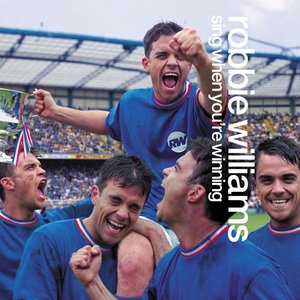Published on Jan 19, 2001
Out of the boy-band black hole, only two current artists have
been able to climb out and establish themselves as pop machines in
their own right. One of them is Ricky Martin, who got booted from
Menudo for being capable of growing a beard. The second was Robbie
Williams, who left Brit boy-band Take That and sent that country’s
masses of teenage girls into crying fits of hysteria. After a
while, he hooked up with Guy Chambers and proceeded to release
several albums that separated him from his boy-band past.
However, just like that famous boy-band from the sixties (you
know, the one with Johnny, Paulie, George and Ringo?), Robbie
understood that true success can only be cemented by conquering the
former British colonies – a.k.a. us. Therefore, he released
The Ego Has Landed two years ago and began to tour the
States. Now, he has returned with his second U.S. release,
Sing When You’re Winning.
First, let me state the obvious –
Sing When You’re Winning is a much better album than
The Ego Has Landed. Why? Because the
Ego album is a compilation of his best tracks from the
British-only releases while
Sing is a fully fleshed album. Minor hits like “Angels” and
“Millennium” had already struck a chord with European audiences,
but the flow of
Ego is not as great as on this new album.
It begins with the danceable and energetic “Let Love Be Your
Energy.” It’s a great kick-off to the album and provides it with
the type of fun that permeates the whole album. In fact, all of the
dance songs are great. The single, “Rock DJ,” has a great 70s vibe
and is lots of fun. “Kids” and “Forever Texas” give you more of
Williams’ and Chambers’ lyrical tongue in cheek. “Supreme” and
“Knutsford City Limits” are also good pop tracks. If the album were
full of nothing but tracks like these, you’d have a very good pop
album.
What makes their work-and this album-truly memorable is their
softer, non-dance tracks. Songs like “Better Man,” “Singing For The
Lonely” and the great “If It’s Hurting You” are very soft ballads
that reveal a desire for deeper meaning in Williams’ and Chambers’
music. It’s something that you saw on
Ego and that strikes a deeper chord here in “Sing,” as the
songs move from one onto another. From the “Angels” – like “Love
Calling Earth” to the great closing track, “The Road to Mandalay,”
the duo manage to remove all of the pop-ness of these songs out and
fill them with emotion. That’s good.
About the only drawback is that the soft songs outnumber the pop
songs. While that’s not too much to bicker about, I’d like to hear
more of Williams’ dance songs. I mean, drive to this CD and listen
to the pop songs. They’ll make you feel real good.
Overall,
Sing When You’re Winning is a good step for Robbie Williams
as he strives to make his presence felt here in Yankland. As long
as he keeps his sense of humor in place and doesn’t grow the ego
that many pop stars claim not to have (ahemBritneyahem), then he
will continue to be unique among our pop constellations. And that
will always be good.
